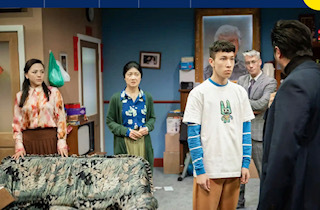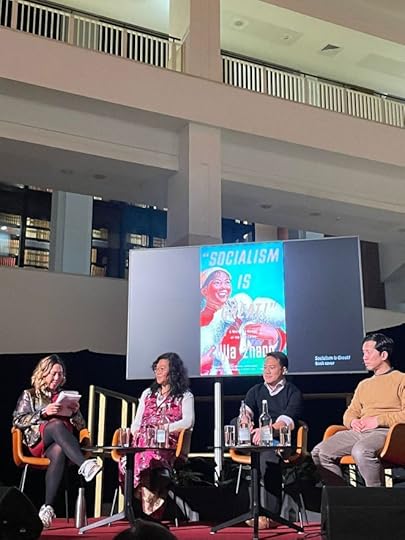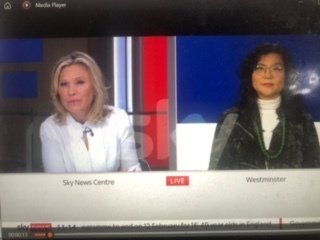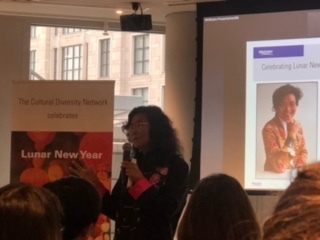Lijia Zhang's Blog, page 19
May 21, 2023
Investing in peace
As G7 leaders gathered in Hiroshima, Jonathan Cohen of Conciliation Resources asks: when are is on the rise, why are these leaders not investing in peace?
May 10, 2023
birthday fundraising
Dear Friends:
I look forward to welcoming you to my party on the 20th. No gifts please, particularly no flowers. If you like, please consider making a donation to charity Engage With China. Please see below my note on my birthday fundraising. Absolutely no pressure. I hope you don’t mind my raising the issue. Many thanks in advance.
See you soon.
My Birthday Fundraising
My birthday is two days away. This year, I’d like to raise some funds for a British charity Engage With China, to which I am a cultural ambassador.
Engage with China provides an educational introduction to China’s cultural and historical context and adds depth to modern British education by building necessary 21st-century skills. In other words, the charity is trying to introduce the Chinese language and culture to schools in the UK.
As many Western countries have turned hostile towards China, it is more important than ever that people in the West should have a better understanding of my home country. I whole-hearted support what EWC does, therefore my fund-raising effort. So instead of saying happy birthday to me or giving me any gifts, please make a donation to Engage With China, if you like. Here’s the link: Unleash cultural curiosity – JustGiving
Many thanks in advance. You’ll be my friend forever!
Love Lijia
May 7, 2023
Coronation
I am not a royalist. I think a monarchy is undemocratic and out of line with modern life. I am certainly not a fan of the British royal family, which has been mired in controversy (Prince Andrew, Harry and such). Will the King Charles III be an enlightened king? Hard to imagine. At this Coronation, people had to swear allegiance to the King! I find it laughable that some would brave the wind and rain and camp outside overnight and so on. Don’t they have someone in their own life they can love and admire? Some argue that the monarchy provides the British people with a sense of national identity. If the British national identity has to rest solely on the monarchy, then that’s very sad.
Yet when a friend kindly invited me to his Coronation lunch party, I didn’t hesitate. Well, I am also a keen social observer. It turned out that most guests at the party are not royalists, either. I thoroughly enjoyed myself. Who wouldn’t want a fun party with great food, interesting people and lively discussion? Thank you Chris and Ari for the fab party!



April 26, 2023
Okay Worth
Worth
A few days ago, I went to see play Worth at Arcola Theatre. It is a dark comedy about inheritance and sibling rivalry in a British Chinese family. The day before their mother’s funeral, four siblings get together in their family home, expecting to find inheritance. They only find 44 pounds. Along the way, dark family secrets – childhood abuse, suicide and grievances – emerge.
The premise looked promising but sadly it didn’t quite deliver. The script, by Joanne Lau, lost its footing and slipped into a soap drama. Some of the tension felt contrived; certain details – the older brother having an affair with his younger brother’s wife – were unnecessary and the performances lacked subtly.
Nevertheless, I am glad that there is such a play about a British Chinese family.
April 15, 2023
my short story
I had a story in the latest issue of Index Censorship magazine, a heartbreaking tale of a left-behind child.
March 14, 2023
Chinese and British panel discussion
Last night, I took part in a panel titled “Chinese and British”, discussing personal identity – being both Chinese and British, in conjunction with the exhibition of the same title at the British Library.
The UK has the oldest Chinese community in Europe and there are plenty of Chinese (just under 1% of the total British population) living here, yet people hardly feel their presence and there’s very limited political representation.
In our panel, we talked about our life stories, our bi-lingual experiences and our thoughts on our personal identities. I found it fascinating how language shapes our identity and even personality.
It was well-attended and I even sold all the copies I brought along. Thank you to my friends who attended the event in person or online.
March 8, 2023
my interview with Tania Branigan on her book Red Memory
The Latest Podcast I hosted, interviewing Tania Branigan on her book Red Memory
I co-host NoVoices, a global network of people who are interested in China and gender issues. In this episode, I interviewed Tania Branigan, who served as the Guardian’s China Correspondent for seven years. Now she writes foreign policy editorials for the Guardian. I particularly enjoyed this episode, because I am immensely interested in the Cultural Revolution, a monumental movement that touched millions of people’s lives, my own family included. Tania is also extremely articulate. Take a listen when you have a moment.
https://podcasts.apple.com/gb/podcast/n%C3%BCvoices/id1413970298?i=1000603272397
February 21, 2023
China’s supposed most notorious serial killer
I claim to be on ‘workcation’ – on holiday abroad while working. Here’s one result. My oped on the lawyer who defends China’s supposed most notorious female serial killer Lao Rongzhi, a case that has fascinated China. Back in the 90s, Lao worked at a seedy bar where she lured rich men to her rented flat. Her lover would then appear and demand ransom. The point is that she deserves a fair trial. And it is a big question if her death penalty is justified.
February 9, 2023
The Spy Balloon Drama
The Spy Balloon Drama
Last Saturday, Sky TV interviewed me about the spy balloon drama. I said I was almost certain that it was a spy balloon, instead of a civilian aircraft collecting weather data. Well, there is an airbase in Montana where the balloon was spotted, but I also made the point that all major countries spy on each other. For example, the Americans sent spy balloons to China in the 70s and in 1974, Zhou Enlai, the premier, ordered to shoot them down. (https://gaodawei.wordpress.com/…/1974%EF%BC%9Au-s…/)
I don’t think China deliberately arranged the incident to blow off Blinken’s scheduled visit to China. It is in China’s own interest to talk with the US. As China is experiencing serious challenges domestically and internationally, it has shown a willingness to soften its stand. For example, they’ve given up the so-called ‘wolf-warrior’ diplomacy.
Most likely, the balloon incident was a case of lack of coordination somewhere. The left hand didn’t know what the right was doing. But the timing was terrible – Blinken was going to China to talk with the Chinese, to ease the tension and to stabilize the relationship. Instead, it further strained the relationship, especially after the US shot down the balloon.
The cancellation of the trip (well, it may be rescheduled in the future) shows the deeply-rooted mistrust between the two countries. The fact that the bilateral relationship reached a new low is not good for China, or the US or the rest of the world. The world needs China’s involvement in many issues from climate change to nuclear proliferation.
I didn’t have time to mention the U-2 spy plane incident. https://en.wikipedia.org/wiki/1960_U-2_incident In 1960, an American U-2 spy plane was shot down by the Soviets inside Soviet territory. Interestingly, the American also claimed it was a plane gathering weather information but was forced to admit it was a spy plane after bits from the plane contradicted the claim.
What do you think? Was the US overreacting by blowing the balloon off? What will happen now?
February 3, 2023
My talk to a Japanese bank
Yesterday I gave a talk to a Mizhuho, one of the megabanks of Japan, talking about my life, the Chinese New Year and the social transformation of China – all fitting into a 30 minutes talk. It was followed by 30 minutes Q&A, and a yummy dim sum lunch.
All went well, I am pleased to say, with a good-turn up and lots of questions, and positive feedback. The bank’s culture diversity team had actually invited me to similar talk two years ago and now invited me back this year.
I’ve given talks to other organizations as part of the cultural diversity drive. The world is filled with people who have different values, religions and traditions. In this modern world, it has become increasingly important that we appreciate others and other cultures, instead of believing that our own way of life is ‘normal’.




